
Audi AG is a German automotive manufacturer of luxury vehicles headquartered in Ingolstadt, Bavaria, Germany. A subsidiary of the Volkswagen Group, Audi produces vehicles in nine production facilities worldwide.
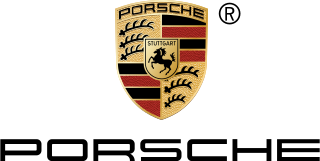
Dr. Ing. h.c. F. Porsche AG, usually shortened to Porsche, is a German automobile manufacturer specializing in high-performance sports cars, SUVs and sedans, headquartered in Stuttgart, Baden-Württemberg, Germany. The company is owned by Volkswagen AG, a controlling stake of which is owned by Porsche Automobil Holding SE. Porsche's current lineup includes the 718, 911, Panamera, Macan, Cayenne and Taycan.

Volkswagen AG, known internationally as the Volkswagen Group, is a German multinational automotive manufacturer headquartered in Wolfsburg, Lower Saxony, Germany. The company designs, manufactures, and distributes passenger and commercial vehicles, motorcycles, engines and turbomachinery, as well as offers related services, including financing, leasing, and fleet management. In 2016, it was the world's largest automaker by sales, and keeping this title in 2017, 2018, and 2019, selling 10.9 million vehicles. It has maintained the largest market share in Europe for over two decades. It ranked seventh in the 2020 Fortune Global 500 list of the world's largest companies.

Auto Union AG, was an amalgamation of four German automobile manufacturers, founded in 1932 and established in 1936 in Chemnitz, Saxony. It is the immediate predecessor of Audi as it is known today.

The Volkswagen K70 is a four-door, front engine, front wheel drive sedan developed by NSU and marketed from 1970–1975 by Volkswagen after its 1969 acquisition of NSU.
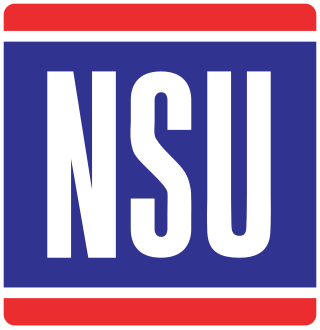
NSU Motorenwerke AG, or NSU, was a German manufacturer of automobiles, motorcycles and pedal cycles, founded in 1873. Acquired by Volkswagen Group in 1969, VW merged NSU with Auto Union, creating Audi NSU Auto Union AG, ultimately Audi. The name NSU originated as an abbreviation of "Neckarsulm", the city where NSU was located.
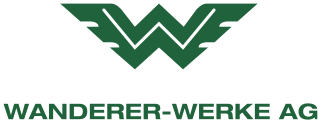
Wanderer was a German manufacturer of bicycles, motorcycles, automobiles, vans and other machinery. Established as Winklhofer & Jaenicke in 1896 by Johann Baptist Winklhofer and Richard Adolf Jaenicke, the company used the Wanderer brand name from 1911, making civilian automobiles until 1941 and military vehicles until 1945.

The Audi 50 is a small 'Supermini' car, produced by German automaker Audi from 1974 to 1978, and sold only in Europe. Introduced two and three years after the French Renault 5 and the Italian Fiat 127 respectively, the Audi 50 and its VW Polo twin were seen at the time as Germany's first home-grown entrant in Europe's emerging class of "supermini" hatchbacks, supplanting a generation of small and often rear-engined economy cars.

The Audi R8 is a mid-engine, 2-seater sports car, which uses Audi's trademark quattro permanent all-wheel drive system. It was introduced by the German car manufacturer Audi AG in 2006.

ZF Friedrichshafen AG, also known as ZF Group, originally Zahnradfabrik Friedrichshafen, and commonly abbreviated to ZF, is a global technology company that supplies systems for passenger cars, commercial vehicles and industrial technology. It is headquartered in Friedrichshafen, in the south-west German state of Baden-Württemberg. Specializing in engineering, it is primarily known for its design, research and development, and manufacturing activities in the automotive industry and is one of the largest automotive suppliers in the world. Its products include driveline and chassis technology for cars and commercial vehicles, along with specialist plant equipment such as construction equipment. It is also involved in the rail, marine, defense and aviation industries, as well as general industrial applications. ZF has 168 production locations in 32 countries with approximately 165,000 (2022) employees.

ZF Sachs AG, also known as Fichtel & Sachs, was founded in Schweinfurt in 1895 and was a well-known German family business. At its last point as an independent company, the company name was Fichtel & Sachs AG.

BYD Auto Co., Ltd. is the automotive subsidiary of the publicly listed Chinese multinational manufacturing company BYD Co. Ltd. It was founded in January 2003, following BYD's 2002 acquisition of Qinchuan Automobile Company. The company produces passenger cars, buses, trucks, electric bicycles, forklifts and electric vehicle batteries. BYD's passenger automobile models include battery electric vehicles (BEVs) and plug-in hybrid electric vehicles (PHEVs), collectively known as new energy vehicles (NEVs) in China. They also produced internal combustion engine vehicles until March 2022.
Federal-Mogul Corporation is an American developer, manufacturer, and supplier of products for automotive, commercial, aerospace, marine, rail, and off-road vehicles, as well as industrial, agricultural, and power-generation applications. It was acquired in February 2022 by Apollo Global Management.
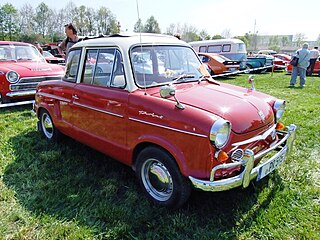
The NSU Prinz (Prince) is an automobile which was produced in West Germany by the NSU Motorenwerke AG from 1958 to 1973.
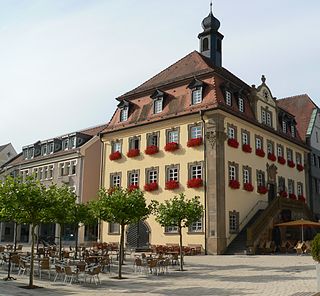
Neckarsulm is a city in northern Baden-Württemberg, Germany, near Heilbronn, and part of the district of Heilbronn. As of 2016, Neckarsulm had 26,800 inhabitants. The name Neckarsulm derives from the city's location where the Neckar and Sulm rivers meet.
Alusil as a hypereutectic aluminium-silicon alloy contains approximately 78% aluminium and 17% silicon. This alloy was theoretically conceived in 1927 by Schweizer & Fehrenbach, of the Badener Metall-Waren-Fabrik, 2a Hermannstraße, Baden-Baden; but practically created only by Lancia in the same year, for its car engines. It was further developed by Reynolds, now Kolbenschmidt. In the United States, Chevrolet was the first to use Reynolds A390 in the Chevrolet Vega.

The automotive industry in Germany is one of the largest employers in the world, with a labor force of over 857,336 (2016) working in the industry.

Rheinmetall MAN Military Vehicles GmbH (RMMV) is a joint venture company between German companies MAN Truck & Bus AG and Rheinmetall AG. RMMV is part of Rheinmetall's Vehicle Systems Division. Rheinmetall AG holds a 51% stake in RMMV, with the remaining 49% held by MAN Truck & Bus. RMMV was initially a provider to security and armed forces of a wide range of armoured and unarmoured transport, command and role-specific wheeled vehicles, but since 2019 and a restructure has focused on military specific and militarised commercial trucks.
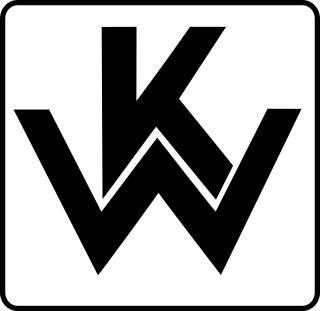
The Karosseriewerke Weinsberg, abbreviated KW, is a German Tooling Company based in Bretzfeld. Originally, it was founded as a Weinsberg-based car coachbuilder, that was known for their recreational vehicles. The city name Weinsberg was used as brand name from 1969 to 1992.
Société du carburateur Zénith was a French corporation specialized in the making of carburettors for both automotive and aerospace industries. Created in Lyon in 1909 by car manufacturer Rochet-Schneider, it was taken over in 1970 by German company DVG. One of the main carburettor manufacturers of the 20th century, it had factories in Lyon and abroad, including in the United States and the United Kingdom.


















